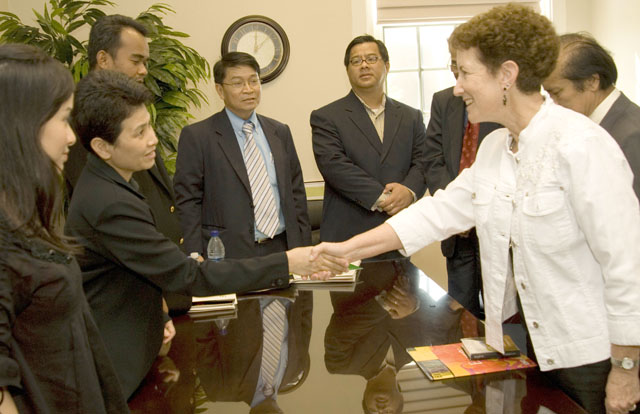Westerners usually conduct negotiations in a brief and possibly efficient manner, sometimes with a forceful voice. Especially in tricky situations, when things don't go as well as expected, “farangs” tend to become loud and emotional.
In Europe or the USA this kind of behaviour may be o.k. Even an argument, where the other negotiating partner is being openly criticized, may be accepted. Often this criticism may even be part of the negotiating strategy.
If you are dealing with Thais and hope to be successful, these tactics are definitely wrong and you will most likely fail. Thailand has a different set of values which in turn leads to a different kind of conduct. This is something you should be well aware of.

The goal may be the same, the way to reach it may differ between westerners and Thais.
Rank and Reputation
The importance of a person depends mainly on his or her age, social standing, their rank in society, but also on their personal wealth. The higher ranking person will usually be treated with respect, whereby the capabilities of that person are irrelevant, or whether that person is competent or fair in the western sense of the word.
Should you be older than your negotiating partner, you will be showered with pleasantries and courteous gestures, but that is purely polite behaviour.
During conversations the Thais take their time - and a lot of it. More often than not they talk about things of no importance. Time just ticks away and at the end the actual subject may not even have been mentioned, and there is certainly no result in sight.
After such a meeting you may not even know what the opposite side wanted from you. So, take your time and keep cool. It seems obvious that with this meeting the other side wanted to get a better picture of you.
You, too, should therefore take your time and remain calm. If you conclude this first meeting in a relaxed and charming way, you have made a lot of progress.
Please bear in mind that the Thais are being educated to keep their emotions in check. They have so many different rules of conduct, which enable them to communicate things without the spoken word.
It will be almost impossible for you to guess the feelings or the thoughts of a Thai just by observing his mimics and gestures. Should you, however, react emotionally or, worse still, loose your temper, you may well have lost a business opportunity, or at least made things more difficult.
Stay calm and be patient, speak in a soft yet determined tone and stick to superficial dialogue. Discussions about politics, religion or one's private life should be avoided. Sport, celebrities, the weather and food are good and uncontroversial subjects. Harmony and the avoidance of conflicts are cornerstones in the life of every Thai. For this reason any criticism should possibly be avoided. Saving face is the greatest priority for every Thai.
By the way, Thai people are mainly interested in long term cooperation and will therefore refrain from entering too fast into new business ventures. It would therefore be advantageous to know some contacts, so they can introduce you into the right circles.
Contracts and Safeguards
In Thailand, as in other parts of the world, people set up written contracts, which become legal when signed by the relevant parties.
The Thais generally prefer contracts with not too many clauses, which leaves the possibility for later changes. Mutual trust seems to be the basis for any contract. Too many clauses or the involvement of a lawyer are usually regarded as a sign of mistrust.
You can do business in Thailand simply on the basis of mutual trust. Sometimes a deal can be struck through a simple handshake. However, one should be careful with this kind of dealings.
Nevertheless, you shouldn't be too fearful when starting any negotiations. And please remember that the Thais often want to make changes to their contracts, even shortly before their ratification or even soon afterwards.

Always be friendly and calm, then everything will turn out fine.
Punctuality
It is advisable to be at the stipulated place at the agreed time. You should, however, not be surprised if your Thai partner arrives late.
Clothing and status symbols
Thai people also judge a person's standing according to their clothes, therefore you should not save on your wardrobe. The more elegant you appear, the better it will be for you.
Status symbols, like an expensive car, top brand watches and clothes, gold jewellery, an expensive mobile phone etc. make a great impression in Thailand. It would be to your detriment if you appeared in a rather simple outfit. Instead of solicitating a price reduction, you would rather loose the other party's respect.
Greetings and Forms of Address
Try to avoid the “wai” unless you know how to do it correctly. A friendly nod is much better. If your Thai business partner reaches out to you, then greet him with a handshake. As a form of address you can use his short name (nickname) with the prefix “khun”, which applies for both men and women. He or she will greet you accordingly using your first name. Other bodily contact, such as a friendly pat on the shoulder, should definitely be avoided.
The Negotiating Process
It usually starts with some trivial chat to get to know the other party. After that one should discuss the main issue of the meeting by speaking gently and without emotions. Now it is important to remain calm, even if the other party comes up with some outrageous propositions. In doing so, you show that you can handle the situation. If you are totally dissatisfied with the negotiations, you can resume them at a later stage, possibly with the help of a “mediator”.
Even if your negotiating partner makes an obvious mistake, you should never criticize him. Build some bridges, make generalisations or use examples in order to save the other person's face. He or she will respect you for it.
The Thai friendliness goes very far, so much so that a Thai will say “yes” or “khrap” to any of your proposals. With that, however, he simply states that he understands what you have said. It does not mean that he agrees with your proposal. Make sure by asking questions, whether you yourself have understood everything correctly. By doing so, your partner will not loose face. In this way you give him diplomatically the opportunity to express his view.

When a little care is taken, the desired objective can usually be achieved.
The Legal Situation
The saying that a Thai is always in the right, is probably just as invalid as the one that says "the upper crust always gets it their way".
Earnest preparations, possibly the consultation of a reputable lawyer as well as a legally binding contract are the best protection against possible legal problems.
Should the rare occasion eventuate that your counterpart makes a dubious impression, you should break up the negotiations, no matter how tempting his proposals may be. Perhaps you should invent some “white lie”. It is most advisable not to have contacts with underworld figures and certainly not to do business with them.
Despite all this advice it is sufficient to simply understand the basic mentality of the Thai people and to behave accordingly with a little tact and courtesy. You should be alert, friendly and calm, yet state your case clearly and firmly. At the same time you should leave some room for compromises.
You should not try to gain the sympathy of a Thai business partner by being too humble. Any Thai will be satisfied if you just follow the basic rules of good behaviour, while still remaining a self confident “farang”.
Recommendation
Here, you find a list of legal advice, law and translation offices which, with our long standing local business experience, we can highly recommend.


